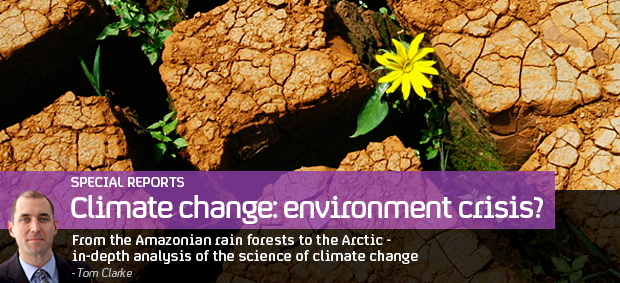Defra scientist’s grim warning on climate change
The planet could be facing a catastrophic 5 degree temperature rise, and we are losing time to address the threat of climate change, one of the government’s leading scientists tells Channel 4 News.
Speaking before he steps down as chief scientist at the Department for Environment Food and Rural Affairs, Sir Bob Watson also warned that governments couldn’t afford to do nothing about greenhouse gas emissions despite the economic downturn, writes Channel 4 News Science Editor Tom Clarke.
At global climate summits like in Copenhagen in 2009 it was agreed to try and limit global warming to two degrees centigrade above pre-industrial temperatures. “There is really almost no chance now of meeting that political target,” said Dr Watson, who also served chair of the UN’s Intergovernmental Panel on Climate Change. “If we continue the way we are we’ve got a 50-50 shot of a 3 degree [warmer] world and I would not rule out a 5 degree world.”
Researchers are confident that level of warming would see the tropical forests of the Amazon and sub-Saharan Africa become arid zones, forcing mass movements of people and agriculture north and southwards. The increased amount of energy in the atmosphere would result in new weather patterns, including more intense rainfall across the globe.
Extreme weather debate
There is currently debate among climate scientists as to whether extreme weather events like the ongoing drought in the US, heatwaves in Europe, and summer flooding in the UK should be directly attributed to a warming climate.
If we continue the way we are, we’ve got a 50-50 shot of a 3 degree world – and I would not rule out a 5 degree world. Dr Bob Watson
According to Dr Watson, the row is an academic one.”There is no question the earth’s temperature is warmer than it was 100 years ago. There’s no question we’re seeing more floods, more droughts, more heatwaves, all of which are totally consistent with the hypothesis of human induced climate change, which points to the fact we humans are changing our environment.”
Questions have also been raised about whether climate “alarmism” from environmentalists, especially at a time of economic crisis, has switched people off to the idea of an environment under threat.
“One of the challenges is how to package the message that human induced climate change is a very serious issue,” said Watson, but without credible messages about affordable solutions to the problem, the argument can be lost, he stresses:
“In the US there is no question the US the anti-climate change lobby is dominating the debate.”
Little progress
Since the failed climate change summit in Copenhagen in 2009 there has been little progress towards international agreement on limiting emissions of planet waming gasses like carbon dioxide.
Some commentators have suggested it is time to abandon the international efforts to reach an agreement. But given the scale of the problem, argues Watson, there will always be a role for the UN-led process.
“There’s no question that movement under the [UN] climate convention is unbelievably slow,” he said, “However emissions in literally all countries need to be reduced so we have to have an international diablogue.”
-
Latest news
-
Ex-Trump lawyer Michael Cohen testifies at hush money trial3m

-
Racial hate speech laws being ‘weaponised’ warns National Black Police Association7m

-
‘Hard to believe so many women going through such horrors’, says woman whose baby daughter was stillborn8m

-
Damning report condemns ‘shockingly poor’ UK maternity services12m

-
People ‘expecting the West to stand by Georgia’, says opposition party leader5m

-





